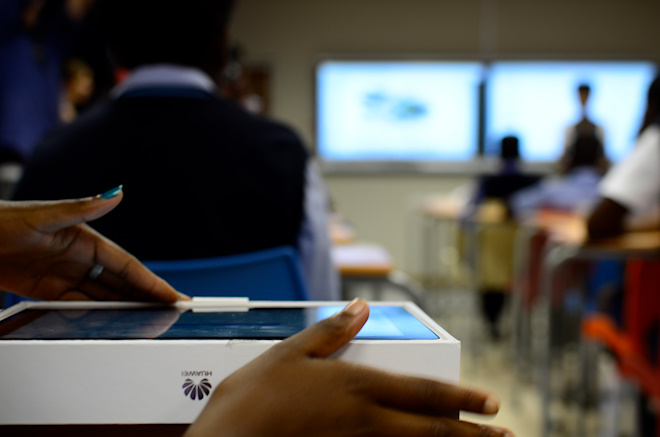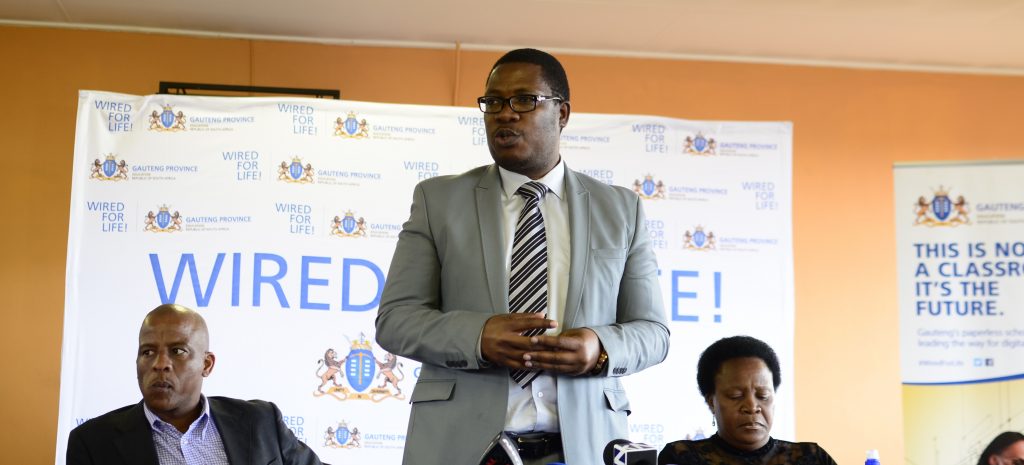Gauteng MEC Panyaza Lesufi officially kicked off the program to replace textbooks with tablets in government schools in the province at Boitumelong Secondary School in Tembisa this morning. Hailing the introduction of tablets as the end of the ‘Irish Coffee” period of education – in which rich students float to the top – Lesufi told journalists at a press briefing that he sees the one tablet per learner project, officially known as “Classrooms of the Future” as a major step towards improving public education in South Africa.
“This is my commitment,” Lesufi said, “There will be no difference in education between township schools and other schools… We’re not looking to compete with other provinces in South Africa, we’re competing with schools in Ghana, India, Brazil and Russia.”
Boitumelong school itself will open for the 2015 term tomorrow, but pupils and teachers arrived early to demonstrate the learning platform that will be used in this, and six other pilot schools, over the academic year. Lesufi says that he wants to investigate whether or not using tablets encourages pupils to work harder and with more enthusiasm in class, and added that by digitising the teaching tools it will be harder for teachers to play truant.
“We can monitor when teachers log-in,” he said, “I really hope that this helps with some of the social problems that we have in this country.”
He did add that while everything is being thoroughly monitored for now, however, exactly how this kind of surveillance would be used in future depended on the trial.
The seven schools involved in the pilot are Sunward Park, Thandi Elanor Sibeko, Ponelopele Oracle Secondary, Boitumelong, Tlamatlama Primary, Tshepisa Primary, and Phumolong Secondary.
Boitumelong is considered the flagship of the project where every pupil over grade 9 has a 4G tablet to take home and furniture and security has been beefed up at the school. Except for Sunward Park, the other schools are being equipped with different – lesser – levels of connectivity and hardware to test different pricing models for covering the whole province.

Lesufi says that he plans to extend the project to all schools in the area starting in the 2017/18 financial year, and will investigate results from each of the seven pilots before costing a final solution. The current pilot projects have been funded without provisioning extra budget, says Lesufi, but through a variety of means.
Firstly, the MEC says, he’s met with mobile networks to force them to deliver on their licensing commitments to provide connectivity for the pupils using LTE. He’s also redeployed most of the 88 000 tablets purchased last year to replace Gauteng Online into the pilot schools, recovering them from schools which had high incidents of theft or simply hadn’t yet opened the boxes.
“Gauteng Online is dead,” Lesufi said emphatically.
Other tools, such as a new computer lab at the school, have been funded by private donors through CSI obligations. Even so, he said, the Boitumelong pilot has cost around R7m drawn from different budgets, and to repeat this in its current form throughout the whole province would cost somewhere in the region of R17bn.
“Clearly we can’t do it alone,” Lesufi said, “We’ll be piggy-backing other departments to minimise the cost.”
The classroom of the future being piloted is modelled on the system that’s been in use at Sunward Park High School in Boksburg for the past two years. That former “model C” was the first state school in South Africa to go textbook free, and has pioneered the use of tablets in public education here.
We’ve written extensively about Sunward in the past.

As with Sunward Park, the schools in this new pilot will be using a centralised portal developed by Bramley’s MIB Software for managing tablets and aggregating educational content into a single portal. MIB’s backend pulls in CAPS aligned digital textbooks from the likes of Via Afrika as well as extra resources from around the web. Content from Wikipedia, the BBC, the complete works of Shakespeare and Khan Academy is all cached locally for teachers to reference during lessons and pupils to use for self-directed study and research.
//Update 15/1/15 According to Pearson South Africa, it is the exclusive provider of CAPS aligned digital textbooks for the purposes of this pilot project. MIB has historically worked with Pearson to help create offline DRM models that allow them to unlock protected books without having to go beyond the school network for activation.
In the demonstration we saw, an economics class was given a lesson using XC Collaboration software to create Q&As for students in class. Ironically, the pupils didn’t actually use the tablets in class – it was purely for the cameras. But other tools – such as the open-source Moodle platform – are widely used in MIB’s system and are being integrated into lesson structures in Boitemolong.
According to the MEC, it should take about two weeks to train teachers on the MIB system, through which they can distribute lesson plans and class notes for a term in advance.
Unlike Sunward, where parents are expected to provide their own tablets for children, in this pilot schools the hardware is provided by the department of education. That may change in the future, the MEC says, as he’s investigating both user-pays models for some services (although the tablets themselves should be free) and leasing options to keep costs down and leave responsibility for maintaining the tablets outside the education department. For the time being, however, each school involved has a team of seven technicians who will be able to replace or repair any tablets damaged in this trial.
The school has a fibre line which feeds its WiFi network, and each tablet has an LTE modem built-in which pupils can use for home study.
When quizzed about security, both in terms of the physical devices and preventing children accessing inappropriate content, Lesufi was relatively vague insisting that each tablet has a tracking device fitted – which we presume to be one of the Find-my-Android software suites rather than a physical tracker – and can only be used for educational purposes.
It’s extremely likely the more enterprising pupils will be putting any content filters to the test in the very near future. We’ll certainly be seeking better answers to these two questions.
In terms of developing the project further, Lesufi says that government schools which achieve 100% matric pass rates in 2015 will go to the front of the queue to be part of the next stage of the pilot.

